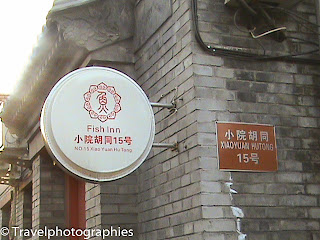China 2012: Hutongs
As wikipedia recalls, a hutong is a type of narrow streets or alleys, most commonly associated with Beijing, China. In Beijing, hutongs are alleys formed by lines of siheyuan, traditional courtyard residences.[1] Many neighbourhoods were formed by joining one siheyuan
to another to form a hutong, and then joining one hutong to another.
The word hutong is also used to refer to such neighbourhoods.
Since the mid-20th century, the number of Beijing hutongs has dropped dramatically as they are demolished to make way for new roads and buildings. More recently, some hutongs have been designated as protected areas in an attempt to preserve this aspect of Chinese cultural history.
My first impression when we were walking looking for our hotel in a hutong was weird, I was not really confident to walk in these small streets.
Finally after several days spending time over there, I must say it was cool to live among Beijing people, to share their restaurant, food and streets.
These streets are not modern but you can feel life. I don't like at all these new and modern streets with high towers, it's cold: neighbours don't know each other, every body close its door.
I finally had the same feeling in these hutongs as in the old streets of Guangzhou.
Our hotel was located in Xicheng district, and near to the Geological museum of China where every night hundred of people come to join one of the several street dancing lessons.
The atmosphere was very friendly. I tried to make some videos of this event, to keep a souvenir.
We almost tried all local restaurants. Once we went to a small one where there were only 10 tables, people smoking, drinking beer and eating a lot of stuff. And no printed menu to give to customers. That was quite impressive because if I was alone, I would never enter that restaurant.
It looked to me more like an inn than a restaurant, because I felt like all customers knew each other or behaved like having habits of eating there.
The food was very good, and the price cheap.
Living in a hutong was an interesting experience, cheapest and more interesting than being in a modern hotel.
Some pictures:
our hotel
small motorbikes and bikes are still very popular in Beijing
actually, people are living behind this old door
Since the mid-20th century, the number of Beijing hutongs has dropped dramatically as they are demolished to make way for new roads and buildings. More recently, some hutongs have been designated as protected areas in an attempt to preserve this aspect of Chinese cultural history.
My first impression when we were walking looking for our hotel in a hutong was weird, I was not really confident to walk in these small streets.
Finally after several days spending time over there, I must say it was cool to live among Beijing people, to share their restaurant, food and streets.
These streets are not modern but you can feel life. I don't like at all these new and modern streets with high towers, it's cold: neighbours don't know each other, every body close its door.
I finally had the same feeling in these hutongs as in the old streets of Guangzhou.
Our hotel was located in Xicheng district, and near to the Geological museum of China where every night hundred of people come to join one of the several street dancing lessons.
The atmosphere was very friendly. I tried to make some videos of this event, to keep a souvenir.
We almost tried all local restaurants. Once we went to a small one where there were only 10 tables, people smoking, drinking beer and eating a lot of stuff. And no printed menu to give to customers. That was quite impressive because if I was alone, I would never enter that restaurant.
It looked to me more like an inn than a restaurant, because I felt like all customers knew each other or behaved like having habits of eating there.
The food was very good, and the price cheap.
Living in a hutong was an interesting experience, cheapest and more interesting than being in a modern hotel.
Some pictures:
our hotel
small motorbikes and bikes are still very popular in Beijing
actually, people are living behind this old door








Comments